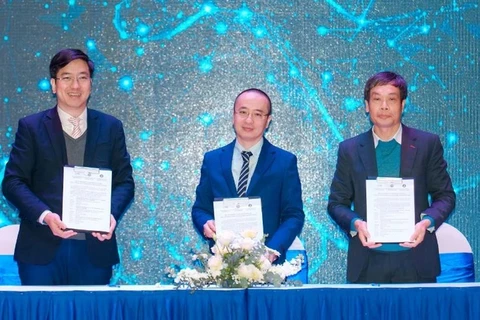Hanoi (VNS/VNA) - To promote responsible business in e-commerce, the Ministry of Industry and Trade (MoIT) actively protects the rights and interests of consumers.
The move follows the increasing number of consumer complaints when purchasing goods on exchanges, e-commerce websites, and social networks.
The MoIT’s 2022 report showed that feedback and complaints in e-commerce ranked second out of 22 groups of goods and services classified by the Consulting Call Centre and Consumer Support System. Notably, the number of feedback and complaints in the e-commerce field in 2022 accounted for about 15% of the total feedback and complaints.
Consumer complaints are mainly related to delayed delivery, delivery of incorrect quantity and quality; goods are damaged or broken due to storage and transportation; e-commerce platform does not support or is slow to refund cancelled orders; shops on the floor block communication and are not responsible for compensating orders for consumers.
Phan The Thang, head of the Consumer Protection Department under the ministry’s National Competition Commission, said that along with development, the e-commerce environment has many potential problems and risks for consumers. Among them, the problem of counterfeit goods, goods of unknown origin and intellectual property violations is prominent.
Many groups and individuals took advantage of e-commerce to provide poor quality goods, counterfeit goods, goods with unknown origin, and goods not consistent with the images advertised on e-commerce, social networking platforms and electronic information sites. In addition, the situation of taking advantage of e-commerce, online platforms, and digital platforms, especially through social networks to defraud and appropriate assets of consumers is also a pressing issue in society and a "headache" for relevant regulatory agencies, according to Thang.
A representative of the MoIT’s Department of E-Commerce and Digital Economy said that recently there has been a situation of fraudulent appropriation of assets through the form of recruiting sales collaborators and placing online orders on e-commerce platforms to receive commissions.
According to the Department of E-Commerce and Digital Economy, along with the inspection and examination activities, the Code of Responsible Business for Consumers in E-commerce issued by the National Competition Commission will help e-commerce platforms self-assess their compliance with e-commerce laws and protect consumer rights. From there, it will help improve the protection of consumer rights and promote sustainable and effective e-commerce business.
Furthermore, this will also help consumers evaluate and choose e-commerce platforms, websites or suppliers of goods and services more fully and feel secure when shopping. This contributes to building an online business cultural foundation, thereby bringing better value to the community and society.
Thang said that protecting consumer rights in the online environment was becoming a hot issue for society in general and state management agencies, businesses and consumers in particular. Therefore, the National Competition Commission and relevant agencies will continue to review and propose improvements to relevant policies and regulations, following the requirements of integration and digital transformation.
At the same time, it is also necessary to develop and complete regulations guiding the implementation of the Law on Consumer Rights Protection, focusing on regulations on protecting consumer rights in the online environment. In addition, the MoIT will organise activities to improve knowledge and skills in consumption for consumers in e-commerce such as warning and guiding consumers to prevent and avoid fraud on e-commerce in cyberspace./.
The move follows the increasing number of consumer complaints when purchasing goods on exchanges, e-commerce websites, and social networks.
The MoIT’s 2022 report showed that feedback and complaints in e-commerce ranked second out of 22 groups of goods and services classified by the Consulting Call Centre and Consumer Support System. Notably, the number of feedback and complaints in the e-commerce field in 2022 accounted for about 15% of the total feedback and complaints.
Consumer complaints are mainly related to delayed delivery, delivery of incorrect quantity and quality; goods are damaged or broken due to storage and transportation; e-commerce platform does not support or is slow to refund cancelled orders; shops on the floor block communication and are not responsible for compensating orders for consumers.
Phan The Thang, head of the Consumer Protection Department under the ministry’s National Competition Commission, said that along with development, the e-commerce environment has many potential problems and risks for consumers. Among them, the problem of counterfeit goods, goods of unknown origin and intellectual property violations is prominent.
Many groups and individuals took advantage of e-commerce to provide poor quality goods, counterfeit goods, goods with unknown origin, and goods not consistent with the images advertised on e-commerce, social networking platforms and electronic information sites. In addition, the situation of taking advantage of e-commerce, online platforms, and digital platforms, especially through social networks to defraud and appropriate assets of consumers is also a pressing issue in society and a "headache" for relevant regulatory agencies, according to Thang.
A representative of the MoIT’s Department of E-Commerce and Digital Economy said that recently there has been a situation of fraudulent appropriation of assets through the form of recruiting sales collaborators and placing online orders on e-commerce platforms to receive commissions.
According to the Department of E-Commerce and Digital Economy, along with the inspection and examination activities, the Code of Responsible Business for Consumers in E-commerce issued by the National Competition Commission will help e-commerce platforms self-assess their compliance with e-commerce laws and protect consumer rights. From there, it will help improve the protection of consumer rights and promote sustainable and effective e-commerce business.
Furthermore, this will also help consumers evaluate and choose e-commerce platforms, websites or suppliers of goods and services more fully and feel secure when shopping. This contributes to building an online business cultural foundation, thereby bringing better value to the community and society.
Thang said that protecting consumer rights in the online environment was becoming a hot issue for society in general and state management agencies, businesses and consumers in particular. Therefore, the National Competition Commission and relevant agencies will continue to review and propose improvements to relevant policies and regulations, following the requirements of integration and digital transformation.
At the same time, it is also necessary to develop and complete regulations guiding the implementation of the Law on Consumer Rights Protection, focusing on regulations on protecting consumer rights in the online environment. In addition, the MoIT will organise activities to improve knowledge and skills in consumption for consumers in e-commerce such as warning and guiding consumers to prevent and avoid fraud on e-commerce in cyberspace./.
VNA
























